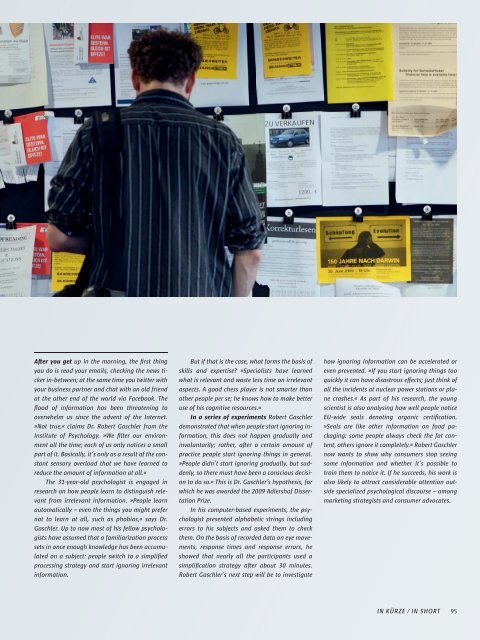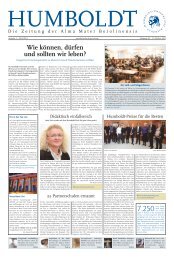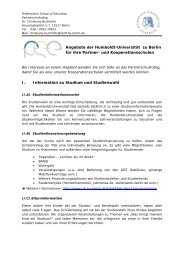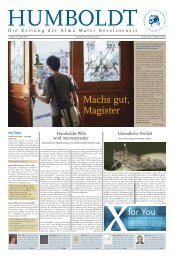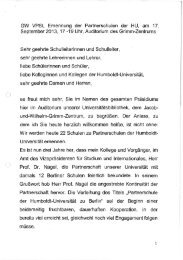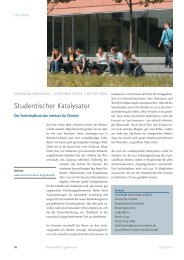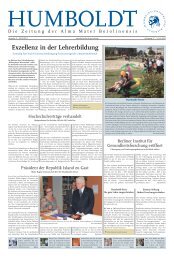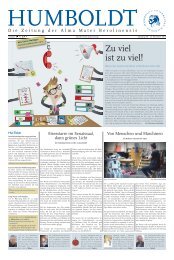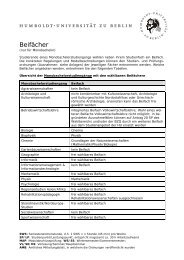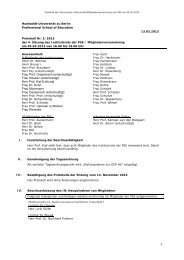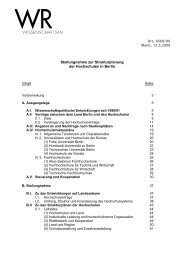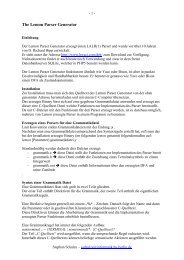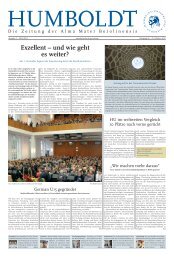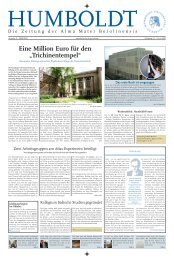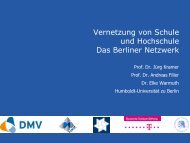hu wissen 1 (pdf) - Humboldt-Universität zu Berlin
hu wissen 1 (pdf) - Humboldt-Universität zu Berlin
hu wissen 1 (pdf) - Humboldt-Universität zu Berlin
Erfolgreiche ePaper selbst erstellen
Machen Sie aus Ihren PDF Publikationen ein blätterbares Flipbook mit unserer einzigartigen Google optimierten e-Paper Software.
Aer you get up in the morning, the first thing<br />
you do is read your emails, checking the news ticker<br />
in-between; at the same time you twitter with<br />
your business partner and chat with an old friend<br />
at the other end of the world via Facebook. The<br />
flood of information has been threatening to<br />
overwhelm us since the advent of the Internet.<br />
»Not true,« claims Dr. Robert Gaschler from the<br />
Institute of Psychology. »We filter our environment<br />
all the time; each of us only notices a small<br />
part of it. Basically, it’s only as a result of the constant<br />
sensory overload that we have learned to<br />
reduce the amount of information at all.«<br />
The 31-year-old psychologist is engaged in<br />
research on how people learn to distinguish relevant<br />
from irrelevant information. »People learn<br />
automatically – even the things you might prefer<br />
not to learn at all, such as phobias,« says Dr.<br />
Gaschler. Up to now most of his fellow psychologists<br />
have assumed that a familiarization process<br />
sets in once enough knowledge has been accumulated<br />
on a subject: people switch to a simplified<br />
processing strategy and start ignoring irrelevant<br />
information.<br />
But if that is the case, what forms the basis of<br />
skills and expertise? »Specialists have learned<br />
what is relevant and waste less time on irrelevant<br />
aspects. A good chess player is not smarter than<br />
other people per se; he knows how to make better<br />
use of his cognitive resources.«<br />
In a series of experiments Robert Gaschler<br />
demonstrated that when people start ignoring information,<br />
this does not happen gradually and<br />
involuntarily; rather, aer a certain amount of<br />
practice people start ignoring things in general.<br />
»People didn’t start ignoring gradually, but suddenly,<br />
so there must have been a conscious decision<br />
to do so.« This is Dr. Gaschler’s hypothesis, for<br />
which he was awarded the 2009 Adlershof Dissertation<br />
Prize.<br />
In his computer-based experiments, the psychologist<br />
presented alphabetic strings including<br />
errors to his subjects and asked them to check<br />
them. On the basis of recorded data on eye movements,<br />
response times and response errors, he<br />
showed that nearly all the participants used a<br />
simplification strategy aer about 30 minutes.<br />
Robert Gaschler’s next step will be to investigate<br />
how ignoring information can be accelerated or<br />
even prevented. »If you start ignoring things too<br />
quickly it can have disastrous effects; just think of<br />
all the incidents at nuclear power stations or plane<br />
crashes.« As part of his research, the young<br />
scientist is also analysing how well people notice<br />
EU-wide seals denoting organic certification.<br />
»Seals are like other information on food packaging:<br />
some people always check the fat content,<br />
others ignore it completely.« Robert Gaschler<br />
now wants to show why consumers stop seeing<br />
some information and whether it’s possible to<br />
train them to notice it. If he succeeds, his work is<br />
also likely to attract considerable attention outside<br />
specialized psychological discourse – among<br />
marketing strategists and consumer advocates.<br />
IN KÜRZE / IN SHORT<br />
95


